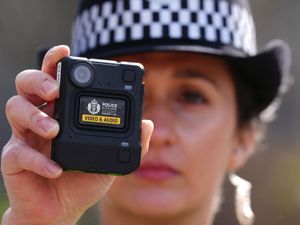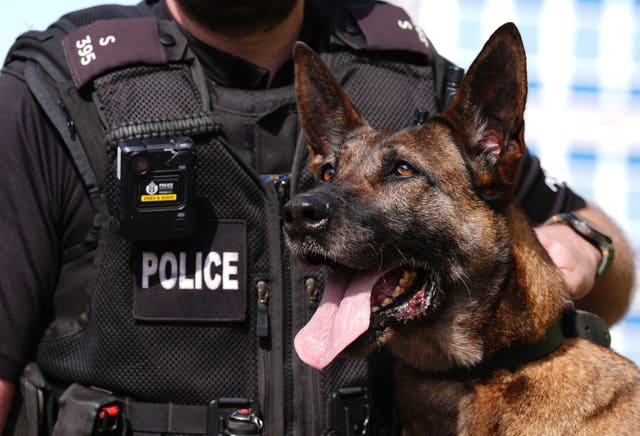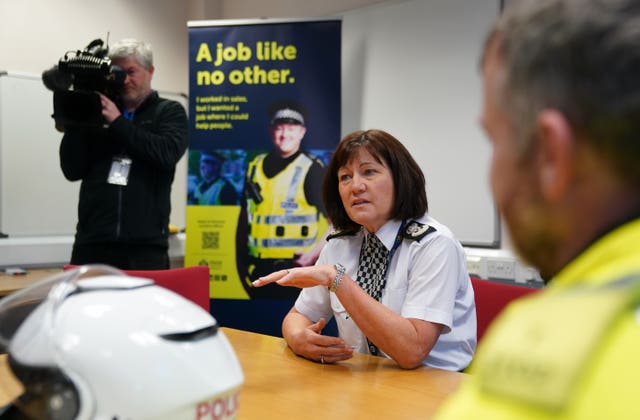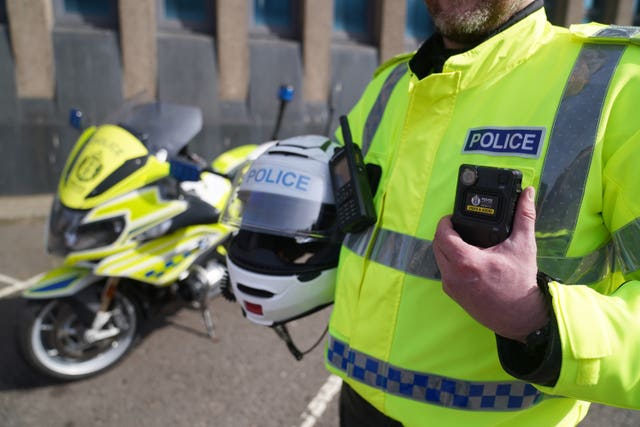Body-worn cameras for police will bring ‘huge benefits’, says chief constable
Jo Farrell expects the roll-out of the bodycams to be completed within 12-18 months.

The rollout of body-worn video cameras for Police Scotland officers will bring “huge benefits” to the force on an operational level, the chief constable has said.
Speaking as the first officers were kitted out with the cameras at Bell Street police station in Dundee on Wednesday, Jo Farrell said she hopes all frontline officers and staff will be equipped with the devices within 12-18 months.
She says the cameras should speed up court citations for police who have been involved in incidents, ultimately driving “faster justice for victims” of crime, and providing officers with additional safety.
She said: “It will bring huge benefits. This is a game-changer for us both in terms of additional reassurance to the public, but importantly we’re able to capture the best evidence to get good outcomes for victims in court.

“It will provide additional safety to our officers, because my experience is that where people are aggressive and offer violence towards officers, their behaviour changes when they know they’re being recorded.”
Around 750 officers covering Dundee, Angus and Perthshire, including road policing officers and dog handlers, will be fitted with the new devices over the coming weeks in the first stage of the national rollout.
More than 10,500 Home Office-approved Motorola Solutions VB400 cameras will be issued to frontline officers and police custody staff across the country as the rollout continues, in what is part of a £13.3 million contract.
Ms Farrell has sought to prioritise the introduction of body-worn video cameras since taking command of the force in October 2023.

It is hoped the deployment of the cameras will help to de-escalate incidents, improve public trust in policing, reduce complaints and support officer and staff safety, as well as bring wider benefits to the criminal justice system.
The rollout was announced in June last year, but the force said in August that it would not begin until March 2025.
Asked why there was such a delay, Ms Farrell said: “The rollout is more than the camera. We need an infrastructure – we’re delivering this across a country, so it needs financial resource, technical resource, and we need to build the infrastructure.
“But now that we’ve started the launch and the rollout, I anticipate it will be very rapid across the country.”
During a Scottish Police Federation conference on Tuesday, its chairman claimed “policing deserts” are becoming widespread across Scotland.
David Threadgold warned a squeeze on police resources, as well as diminished trust between officers, the chief constable and the Scottish Government due to pay negotiations, had led to more officers leaving the force.
Ms Farrell said on Wednesday she is “far more optimistic” than Mr Threadgold, stating the cameras could be instrumental in rectifying the issue.
She said: “It’s my role to ensure that we have the strongest policing front line across the whole of Scotland.
“The body-worn rollout is part of that, in terms of it will reduce the time that officers are in court, it will provide extra protection to them, and it will provide them the security and reassurance when people maliciously complain against them, they’ll be able to evidence the fact that they’ve acted in a professional and proper way.”

Some officers have voiced confidence the cameras will speed up court appearances for police, and that it will help with public trust in policing.
Pc Anna Bannerman said: “Everything we do will be recorded. There’s not going to be any question over how we’ve presented ourselves or the tasks we’ve carried out.
“When we get cited for court it can sometimes be on our days off, which is quite a big disruption for us and we find ourselves waiting to be seen in court, so having these cameras should be a massive help.”
Justice Secretary Angela Constance said: “Body-worn video can increase public confidence in policing and improve safety for police officers and staff. It can also benefit victims and witnesses of crime by allowing cases to be brought to court sooner.
“The use of body-worn video is supported by a world-leading £33 million Scottish Government initiative for sharing digital evidence from crime scene to court room.
“Digital evidence sharing capability, which is also being rolled out across Scotland, is leading to efficiencies across the criminal justice system, delivering benefits for victims, police officers, prosecutors, defence lawyers, court staff and judges.”
Scottish Police Authority interim chairwoman Fiona McQueen said: “The rollout of body-worn video to frontline officers has been a longstanding aspiration for policing in Scotland and this marks an important milestone in that journey.
“The benefits of this technology are well documented. It will benefit the safety of our officers and the public and wider criminal justice system in terms of the effectiveness of investigations.”





